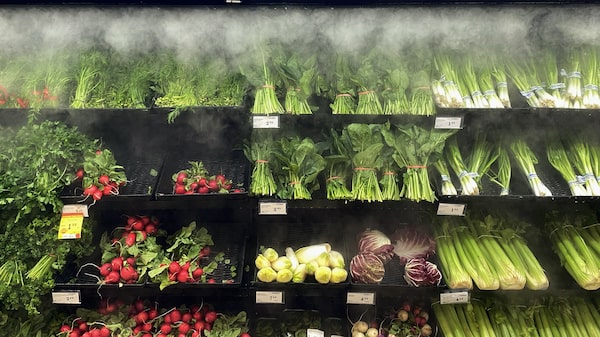
Produce at a west-end Toronto Sobeys grocery store on June 26. The House of Commons agriculture committee is asking the heads of Canada's major grocery chains to testify about their plans to stabilize grocery prices after the federal government announced commitments secured from the grocers.Graeme Roy/The Canadian Press
A House of Commons committee is demanding the country’s top grocery stores disclose the strategies and initiatives the chains have taken to stabilize prices and is again asking their top executives to testify.
The agriculture and agri-food committee passed the motion at an in-camera meeting last Thursday, the minutes of which were only released this week. The vote set off a two-week clock for Loblaw Cos. Ltd. L-T, Metro Inc. MRU-T, Sobeys (under parent company Empire Co. Ltd. EMP-A-T), Walmart Canada WMT-N and Costco Wholesale Canada COST-Q to comply with the request from parliamentarians.
MPs asked the companies to share “a comprehensive report on their strategies and initiatives taken to date and on further actions aimed at the stabilization of grocery prices in Canada.”
The documents are due on Nov. 2, according to the committee motion, which also says MPs would review them privately and report findings to the House of Commons.
The committee also invited Loblaw chairman and president Galen Weston, Metro chief executive and president Eric La Flèche, Empire CEO and president Michael Medline, Walmart Canada president and CEO Gonzalo Gebara and Costco Canada executive vice-president Pierre Riel to testify.
The motion allows for the executives to be summoned if they don’t accept the invitation. They last testified at a House of Commons committee in March. Since then, grocery stores have come under increased scrutiny as cost-of-living issues dominate voters’ concerns.
The Globe and Mail asked all five companies if they would comply with the requests. Only Sobeys replied with a comment.
The company hasn’t yet received an invitation, but will participate if asked, Sobeys spokesperson Laetitia Tchatat said. However, she also cautioned that given that its plans are commercially sensitive, Sobeys won’t discuss them publicly before launching them in stores.
Amid flagging public support and fundraising numbers for his Liberal Party, Prime Minister Justin Trudeau in September said the government would require the grocery chains to come up with plans to stabilize and lower food prices.
However, the government has since said it only expects the stores to bring price growth in line with overall inflation. Food price inflation has outpaced general inflation for more than a year, but has slowed in recent months – a trend that economists say is expected to continue.
Earlier this fall, Industry Minister François-Philippe Champagne announced the grocery chains had shared their plans with the government, which he said included discounts, price freezes and price-matching campaigns.
However, Mr. Champagne offered few details about those promotions and most grocers have not confirmed details of their plans. The minister later said he wished grocers were “more forthcoming” with the public.
MPs on the House committee said the lack of clarity is why they decided to start the review, which will also feature testimony from the Industry Minister and Finance Minister Chrystia Freeland.
B.C. NDP MP Alistair MacGregor said the committee wants to understand what is actually resulting from the government’s September request to grocers. The goal is to “have a look at what their internal plans are and how those coincide with what the minister has also been saying to the public,” he said.
Ontario Liberal MP Francis Drouin said he will be looking for what, if anything, the stores are doing to stabilize prices beyond what they were already doing, such as annual price-freeze campaigns.
Mr. Champagne said Tuesday he had recommended parliamentarians call the executives back to testify and applauded the committee motion. “Having the companies come explain their plans, I think, is the right thing to do,” he told The Globe.
However, Sylvain Charlebois, a Dalhousie University professor and director of the school’s Agri-Food Analytics Lab, said he has growing reservations about the government’s interference in the grocery market, which are now being amplified by the House of Commons.
He said Ottawa risks hurting the already weak competition in the grocery market because the more information it forces the companies to divulge, the more risk there is that competitors will get the sensitive information, which would result in less competition.
“If everyone knows what everyone is doing, that’s not competition, that’s collusion,” Prof. Charlebois said.
“It’s just starting to look a lot like government-co-ordinated collusion,” he said, “and that’s anti-competitive for one, and two, it will likely make all grocery stores – or grocers – extremely uncomfortable.”
He also questioned the government’s work given that food price inflation is already slowing.
“The government is trying to get credit for something that is already happening,” he said.
He said if the government actually wants to reduce prices, it could look at temporarily pausing increases in the carbon tax and lifting the sales tax on some foods, including prepared salads.
With a report from The Canadian Press
 Marieke Walsh
Marieke Walsh